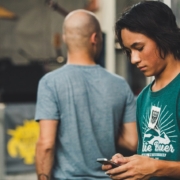Social Media Part 4: Compare Despair
When I was growing up my mother would buy magazines. I remember looking at the images and wishing I looked like the women in the photos. Of course I didn’t realize how much it affected me at the time. It wasn’t until later I truly understood how those images contributed to how I felt about myself. They dictated how I should look and even told me how to get there with all the latest diet craze. It took a toll on how I viewed myself. It really impacted my eating, exercising regime, and dictated the voice in my head that continued to push for something I was not. It wreaked havoc on my self esteem and exploded my insecurities. I promised myself that if I had a daughter I would never buy magazines. I never wanted my daughter to think she had to look like someone else. I didn’t want her to think she had to be something other than herself. AND then the internet happened. It’s one big magazine plus so much more.
Now it’s not just an image or two that we are comparing ourselves to. It’s an endless stream of images. A door that is always open for you to see someone that doesn’t look like you.
And it’s not just an image, it’s more. Social media allows us to peer into other people’s lives. We aren’t just comparing how we look. We now compare our whole lives to someone else’s–in fact, lots of other people! Or so we think it is their whole life. It can leave us with feeling like our life is deficient in some way, that we are deficient… not good enough. The lens we use when we scroll through social media is that of “what I am not”. I don’t look like that, I don’t have that, I am not doing that, I am not doing enough. Questioning every part of ourselves, leaving us feeling we are doing life wrong.
Social media creates an illusion that everyone is living a perfect life: successful, seems to have it all together, has no struggles, and is an expert at life. This leaves the surfer feeling that something must be wrong with them. Not only do they not look the right way, but now it’s, ‘I don’t seem to know how to live life the right way. I must have it all wrong.’ And if we’ve got it all wrong, if our life isn’t following some sort of trajectory that social media dictates, we can feel we aren’t enough in some way. It’s a trap.
It’s hard to see that it isn’t reality. We are seeing a snapshot of someone. How do we know someone’s life from a series of photos? We don’t but for some reason we still believe we know them and how they are living life. And of course it must be better than how we are doing life. Perfect, of course.
I want to call Wikipedia and ask them to change the definition of perfect. Here is what I propose: Perfect: for humans, an impossibility, an unachievable state. An illusion some feel others have achieved. Trying to achieve it or holding belief that it is possible will cause pain and likely create another issue or multiple issues. The remedy: transparency by all to distill the illusion and squash the feelings of vulnerability in disclosing non perfectiness.
If there are other areas in your life where you feel you are being compared to others, it can compound these ideals making it difficult to withstand the comparison trap.
Comparison robs us of our joy, taking us to a place where we feel less than. I know comparing is hard not to do. One thing to keep in mind that might be helpful: isn’t a person’s character what’s fundamentally important? And how do we know someone’s character from a series of photos? We don’t. So when you’re scrolling, remember you really don’t know their life. No one is posting the difficult moments they experience. No one is posting the mistakes they make.
A good mantra to remember is: I have enough, I do enough, I am enough. Remembering this while scrolling through social media is a good way to keep yourself grounded and less likely to compare yourself to others.



